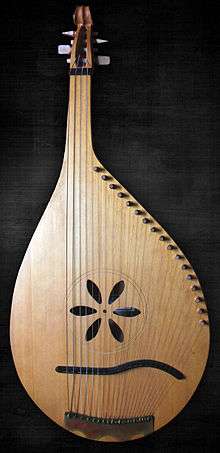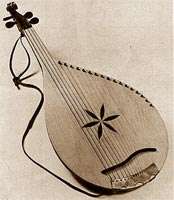Starosvitska bandura
 | |
| Classification | |
|---|---|
| Hornbostel–Sachs classification | 321.321-5 |
| Playing range | |
| c2-g5 | |
| Related instruments | |

The Starosvitska bandura or traditional bandura is a Ukrainian folk instrument of the zither family, common from the late 18th century.
The Starosvitska bandura is also referred to as "Classical", "authentic" or "old-time" bandura.
These instruments usually have some 12-20-23 strings, tuned diatonically (4-6 bass strings and 16-18 treble strings known as prystrunky). These instruments are handmade, usually by local village violin makers with no two instruments being identical. The backs are usually hewn out of a single piece of wood, usually willow, and wooden pegs made of hard woods. The strings are tuned to a diatonic scale (major, minor, or modal) with bass strings tuned to corresponding I, IV, and V degrees of the diatonic row.
Traditionally these instruments had gut strings, however, after 1891 with the introduction of mass-produced violin strings steel strings began to become popular and by the beginning of the 20th century they were prevalent.
It is suggested that the instrument developed as a hybrid of gusli (Eastern-European psaltery) and kobza (Eastern-European lute) and although the term bandura can date itself to Polish chronicles from 1441, this hybridization occurred in the late 18th or early 19th centuries.
The instrument was used almost exclusively by itinerant blind epic singers in Ukraine, called kobzari.
In recent times there has been a movement of renewed interest in playing the authentic folk version of the bandura initiated by the students of Heorhy Tkachenko in the 1980s. Formal courses have been designed for the instrument as have been written handbooks. A category for authentic bandura playing has been included in the Hnat Khotkevych International Folk Instruments competition held in Kharkiv every 3 years.
See also
Bibliography
- Diakowsky, M. - A Note on the History of the Bandura. The Annals of the Ukrainian Academy of Arts and Sciences in the U.S. - 4, 3-4 №1419, N.Y. 1958 - С.21-22
- Diakowsky, M. J. - The Bandura. The Ukrainian Trend, 1958, №I, - С.18-36
- Diakowsky, M. – Anyone can make a bandura – I did. The Ukrainian Trend, Volume 6
- Haydamaka, L. – Kobza-bandura – National Ukrainian Musical Instrument. "Guitar Review" №33, Summer 1970 (С.13-18)
- Mishalow, V. - A Brief Description of the Zinkiv Method of Bandura Playing. Bandura, 1982, №2/6, - С.23-26
- Mishalow, V. - A Short History of the Bandura. East European Meetings in Ethnomusicology 1999, Romanian Society for Ethnomusicology, Volume 6, - С.69-86
- Mizynec, V. - Folk Instruments of Ukraine. Bayda Books, Melbourne, Australia, 1987 - 48с.
- Cherkasky, L. - Ukrainski narodni muzychni instrumenty. Tekhnika, Kiev, Ukraine, 2003 - 262 pages. ISBN 966-575-111-5